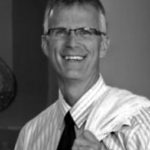The only day I played hooky at Logan College was when I learned that special visitors to campus were in town the day after lecturing on campus – and they had no definite plans. OMG! The pair were Belgians, a 40-something chiropractor and his uncle. As a glorious boon to me, they’d never seen St. Louis.

There is so much to see in St. Louis. I volunteered to be their guide. The Arch, the Zoo (free!), Forest Park, and the Botanical gardens. At the Gardens we bantered in the currents of chiropractic science and practice in Europe and America. Heady days for me. It was not exactly Ferris Bueller’s Day Off.
Many of you will remember my touring guests: Dr. Henri Gillet (the author of “Belgian Chiropractic Research Notes” and co-developer of dynamic spinal palpation techniques) and his nephew, Dr. Stephane Plétain. As we were walking in the Gardens, Dr. Plétain spoke, and I listened. (Dr. Gillet was resting.) The Greeks called students “Peripatetics” because they walked (patein) around (peri) while the teacher lectured. The most famous venue for this activity was at a grove considered sacred to philosopher Apollo Lyceius, who taught there. The covered walkway used for his ambulant lectures was called the “Lyceum” and the founder of the school was Aristotle. Presciently, our profession’s founders, learned men for the times, and clearly familiar with Greek philosophical traditions, named their yearly research update the Lyceum. A main goal, for both Lyceius and the Palmers, was the advancement of knowledge. This emphasis on knowledge was spot on.
Three Observations About Knowledge
First, knowledge is progressive. A consideration of the tech explosion is all the proof needed. The computing power in your hand or on your wrist used to require several floors of your local bank building. The profusion of scientific knowledge is such that even if you read 40 journal articles per day, at the end of the year you would be “behind” by several centuries at least. Keeping up in a healthcare profession has never been more challenging. The continuous flow of information spews forth like water from a fire hydrant. It taunts us to try and drink if we dare.
Second, gaps in knowledge are inevitable. “Mind the gap” is pithy advice not only for the Tube traveler in London, but also the knowledge traveler in the new millennium. As we must not be caught looking the wrong way as we cross a London Street, neither can we ford the rapids of new information without a wrestler’s grip on where our knowledge gaps are, and which gaps are worthy of our attention. Self-awareness is key.
If we’re humble enough, clinical practice is a relentless schoolmarm. It confronts us daily with gaps in our knowledge, like a wrap on the knuckles. These are the gaps that are relevant and worth filling. In the evidence-based practice class I teach, I have my students imagine answering a patient’s question they know absolutely nothing about. It is in that precise moment that the student, as well as us in our clinics, have two choices: go to MSU, or solve the knowledge gap. By MSU, I don’t mean Michigan, Mississippi, or Montana State. I mean “make stuff up.” “Doctor, when is it safe for my daughter to return to soccer after a concussion?” MSU. “My disc herniation has healed. What are the risks of recurrence?” MSU. Filling a knowledge gap is more effortful than MSU, but worth it EVERY TIME. A patient I could not help with chiropractic care asked me whether she should consider basivertebral nerve ablation (BNA). I was clueless. But alas, a quick clinical query on PubMed yielded 5 BNA papers, one with 5-year follow-up. I printed the paper for the patient, appraised it together with her, and helped her identify questions to ask at her next pain management consult. Though not able to answer her original question, I think I still helped.
Third, filling knowledge gaps has powerful benefits. These benefits include purpose and meaning in connecting with and caring for others and doing what’s best for the patient. If we are learning – even in front of our patients – they can tell we care. This engenders trust and respect. Patients tell others. It’s an upward spiral. By filling gaps, we are reminded that our best days are still ahead. We are not finished yet. Practice remains fresh, vibrant, and alive. Without filling the knowledge gaps, we may reflect on a one-year career practiced 30 times. Boring. We owe ourselves better!
The assimilation of progressive knowledge incumbent upon us hinges more critically than ever on this: the acquired habit of learning. This habit is possessed by all life-long learners. A primary aim for my upcoming contributions to the ACA blog is mining for scientific gems to help make the essential work of scientific updating relevant, interesting, and fun.
Advancement in knowledge is a deep well of satisfaction because it translates into better care. Our best days are ahead.
Joel Carmichael, DC, PhD practices at The Center for Spine, Sport & Physical Medicine in Colorado. He teaches at Universidad Central del Caribe in Puerto Rico and maintains volunteer clinical faculty status at the University of Colorado School of Medicine. His research seeks to improve the practice habits of sport and spine professionals. Dr. Carmichael loves teaching, latté art, C.S. Lewis, and an occasional morsel of chocolate. He and his wife enjoy morning strolls with their golden retrievers, Stella and Noli.
